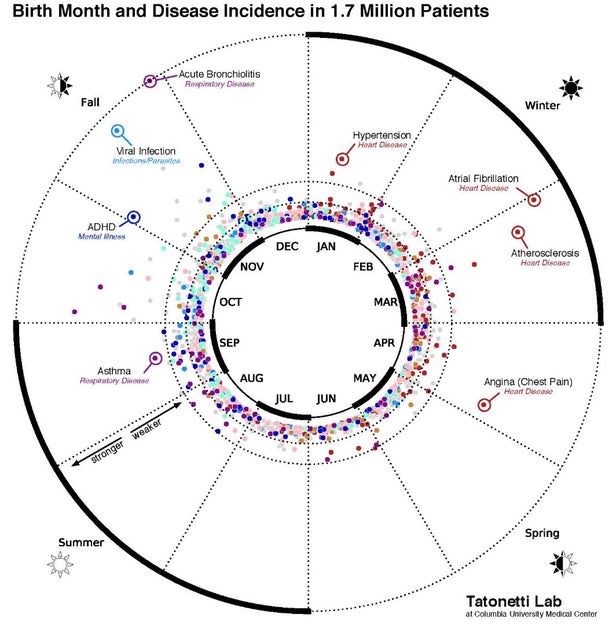Being Born in January Could Up Your Risk of Diabetes
Babies born in winter have a greater risk of developing type 2 diabetes later in life and fall babies have a greater lifetime risk of depression. What might explain these curious connections?
A team at Columbia University has studied the health records of over ten million people across three different countries and discovered some compelling links between a person’s lifetime disease risk and the month they were born in.
It has become increasingly clear that prenatal and early childhood environmental exposures can affect one’s health in adulthood. However, studying these links poses special problems. “A conventional prospective study would be lengthy, costly, and, above all else, unethical,” said study leader Nicholas Tatonetti, PhD, assistant professor of biomedical informatics at Columbia University and in Columbia’s Data Science Institute. “But we can address these questions by analyzing health records, looking for connections between birth month—as a proxy for environmental exposures—and actual health outcomes.”
In a 2015 study, Dr. Tatonetti and Mary Regina Boland, PhD, a former CUMC graduate student now at the University of Pennsylvania’s Perelman School of Medicine, analyzed the health records of 1.7 million people in New York City, finding intriguing links between birth
month and long-term disease risk. For instance, asthma risk was greatest for babies born in July and October.“But that study didn’t reveal what the mothers may have been exposed to during these months that might account for the increased risk in their children,” said Dr. Tatonetti. “To answer those questions, we needed to look at several countries, with a variety of climates and seasonal exposures.”
In the course of this study, electronic health records from 10.5 million individuals from the United States, South Korea, and Taiwan were analysed using a method developed by Drs. Boland and Tatonetti. The study found that mothers who were exposed to low levels of sunlight during the third trimester of pregnancy had babies with an increased lifetime risk of type 2 diabetes. For babies born in New York City, a birthday between December and March, when light levels are lowest, corresponded to an increased diabetes risk.
A mother’s increased exposure to fine air particulates during the first trimester was associated with her child’s increased risk of atrial fibrillation (a potentially dangerous abnormal heart rhythm). In New York City—where air pollution is highest in the summer—that means babies born in the winter are at highest risk. Similarly, mothers who were exposed to high doses of carbon monoxide—which varies seasonally depending on location—during the first trimester had babies with an increased risk of depression and anxiety.
“All of our major findings linking birth seasonal patterns with variance in environmental exposures fit into known mechanistic pathways,” said Dr. Boland. “This is crucial because it demonstrates the utility of our method and further underscores the importance of environmental exposures during development and the impact they may have throughout life.”
The study also demonstrated that the strongest factor in determining whether a child would later be diagnosed with attention deficit hyperactivity disorder (ADHD) was not birth season. Rather, children who were younger than their peers at the time they were enrolled in school had a higher risk of ADHD, with an 18 percent difference in risk between the youngest and oldest children. While the findings of this study are similar to those of single-country studies, this is the first to investigate relative age and disease in multiple countries with four different school enrollment cutoff dates.
“Overall, our findings demonstrate the importance of environmental factors, including socio-environmental factors such as relative age, on the development of childhood diseases,” said Dr. Boland.
































